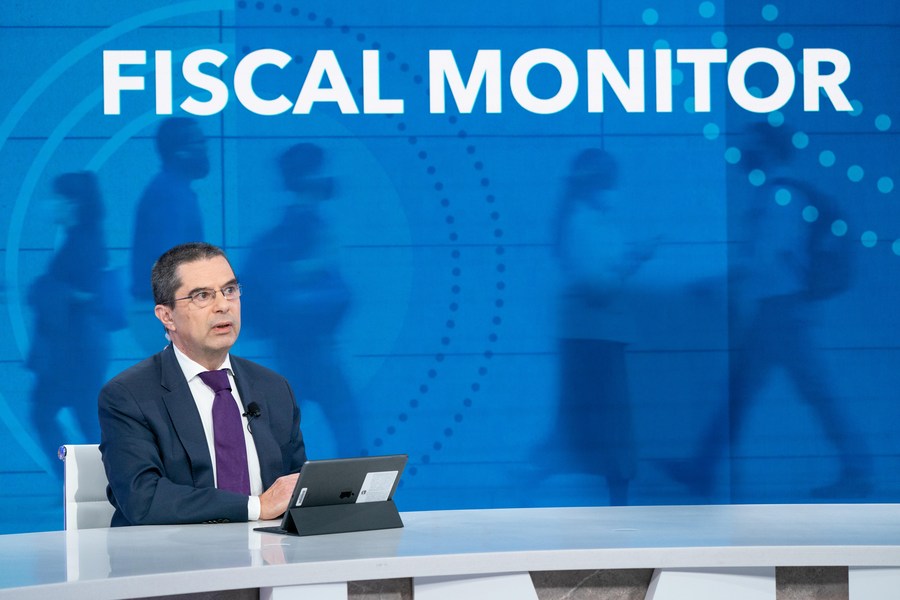IMF urges policymakers to keep tight fiscal stance to help fight inflation

International Monetary Fund (IMF) Fiscal Affairs Department Director Vitor Gaspar participates in the Fiscal Monitor press conference during the 2021 annual meetings in Washington, D.C., the United States, on Oct. 13, 2021. (IMF Photo/Allison Shelley/Handout via Xinhua)
"Facing high debt levels and rising borrowing costs, policymakers should prioritize targeted support through social safety nets to the most vulnerable people," the IMF said in a blog.
WASHINGTON, Oct. 12 (Xinhua) -- The International Monetary Fund (IMF) on Wednesday urged policymakers to prioritize protecting the vulnerable through targeted support, while keeping a tight fiscal stance to help fight inflation.
"Governments confront difficult trade-offs amid sharp increases in food and energy prices," Vitor Gaspar, director of the IMF's fiscal affairs department, and his colleagues said in a blog as the organization released its latest Fiscal Monitor.
Policymakers must protect low-income families from large real income losses and ensure their access to food and energy, the blog noted.
"But they must also reduce vulnerabilities from large public debts and, in response to high inflation, maintain a tight fiscal stance so that fiscal policy does not work at cross-purposes with monetary policy," it continued.
Higher prices threaten people's standard of living everywhere, prompting governments to introduce a variety of fiscal measures, including price subsidies, tax cuts, and cash transfers, the median fiscal cost of which is estimated to account for 0.6 percent of national gross domestic product.
Limiting price increases through price controls, subsidies, or tax cuts would be "costly" to budgets and "ultimately ineffective," Gaspar and his colleagues argued.

International Monetary Fund (IMF) Fiscal Affairs Department Director Vitor Gaspar participates in the Fiscal Monitor press conference during the 2021 annual meetings in Washington, D.C., the United States, on Oct. 13, 2021. (IMF Photo/Allison Shelley/Handout via Xinhua)
"Facing high debt levels and rising borrowing costs, policymakers should prioritize targeted support through social safety nets to the most vulnerable people," they said.
The Fiscal Monitor noted that in a time of high inflation, policies to address high food and energy prices should not add to aggregate demand, noting that demand pressures force central banks to raise interest rates even higher, making it more expensive to service government debt.
"A tightening fiscal stance sends a powerful signal that policymakers are aligned in their fight against inflation."
Despite the economic slowdown, inflation pressures are proving broader and more persistent than anticipated, according to the IMF's latest World Economic Outlook report released Tuesday.
Global inflation is now expected to peak at 9.5 percent this year before decelerating to 4.1 percent by 2024, the report said.
Photos
Related Stories
- IMF downgrades 2023 global growth forecast to 2.7 pct
- IMF chief highlights "fundamental shift" in global economy
- IMF again cuts global growth forecast, highlighting inflation risks
- Interview: IMF warns of further downside risks for global economy
- IMF chief urges fast, well-coordinated actions to tackle food crisis
- IMF lifts weighting of RMB, dollar in SDR currency basket
- IMF official says faster U.S. rate hike could mean financial "complexities" for Asia
- Fiscal outlook subject to elevated uncertainty amid Russia-Ukraine conflict: IMF
- IMF cuts global growth forecast amid Russia-Ukraine conflict, warns of inflation risk
- IMF cuts 2022 global growth forecast to 3.6 pct amid Russia-Ukraine conflict
Copyright © 2022 People's Daily Online. All Rights Reserved.









